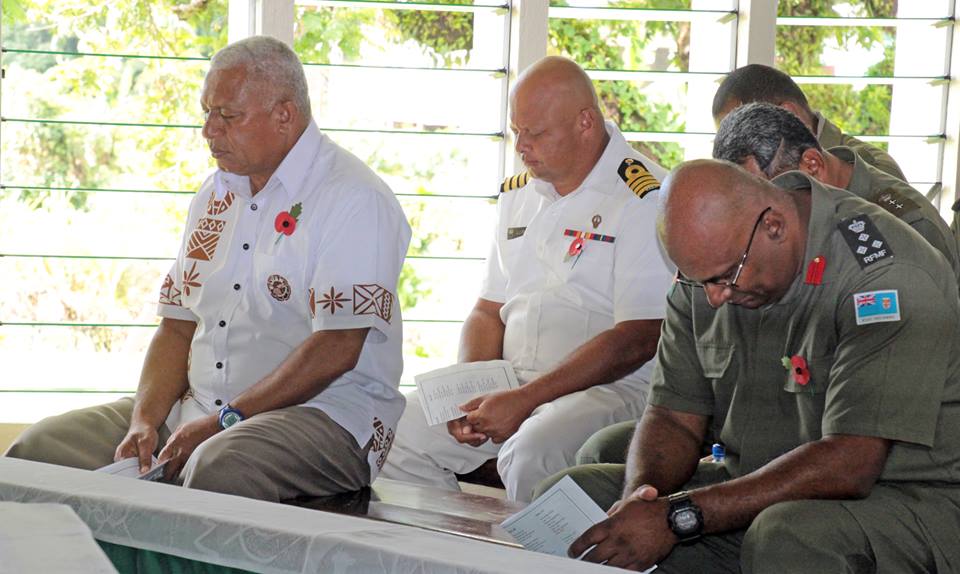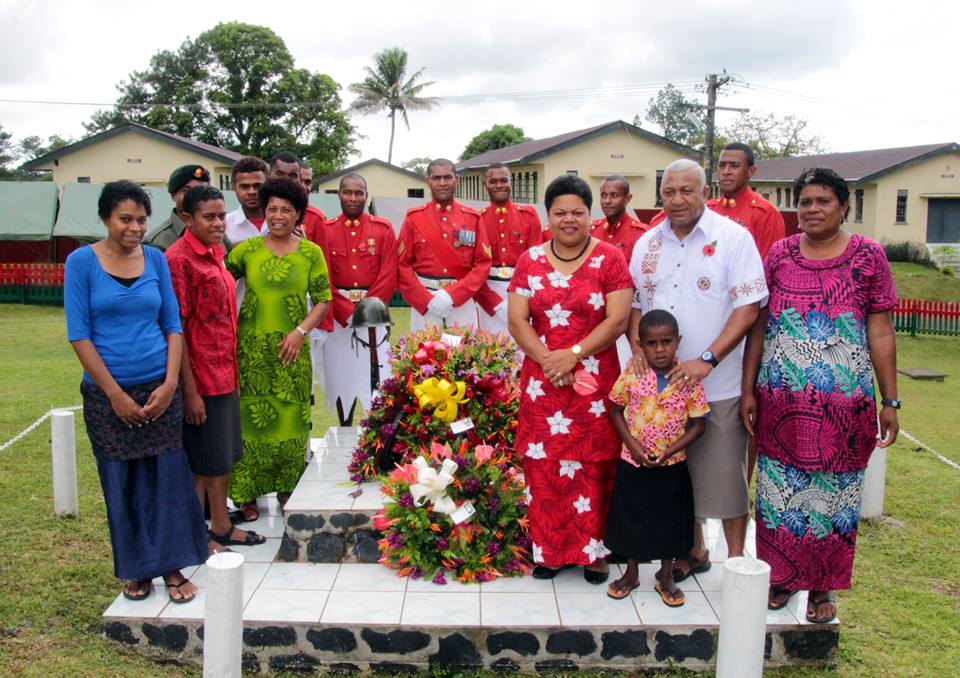Prime Minister Voreqe Bainimarama must have a very short memory span if he can stand up in a public forum and claim that he does not condone human rights abuses of any kind.
This is what he told those attending a regional workshop on the United Nations Convention Against Torture and other Cruel, Inhumane and Degrading Treatment or Punishment in Sigatoka on Thursday.
For those who care to remember, as Prime Minister as well as Army Commander, he has a record of torture and abuses linked to him personally.
But then such hypocrisy and sanctimonious pronouncements in public are characteristic of Mr Bainimarama and his Qorvis-prepared speeches.
Under his charge as Army Commander CRW soldiers were brutally tortured following the mutiny at Queen Elizabeth Barracks in November 2000. It was under his command as well that rebels of the Speight group in Labasa were brutalised once they were rounded up in July/August 2000.
Following the 2006 coup, there have been numerous reports of atrocities and brutalities committed by the RFMF on dissidents who opposed the Army takeover:
Detainees, even old people, being forced to run around the camp naked; former RFMF chief of Staff Ratu Tevita Mara himself has claimed that the Commander clad in a balaclava assaulted women activists in the military camp at night, including pregnant women; some deaths have also been attributed to Army brutality around this time.
Under the Public Emergency Regulations (PER) of 2009, trade unionists were assaulted by soldiers and both Sugar and General Workers general secretary Felix Anthony and NFU official Gaffar Ahmed claimed afterwards they were beaten up on the orders of the Prime Minister. Innocent cane farmers were also detained and made to run around the Army camp, on false accusations of burning their cane.
Reports on human rights abuses by Fiji have been filed by Amnesty International, the US State Department as well as the United Nations Human Rights Council. The most shocking of these was the torture inflicted by members of the security forces on five escaped prisoners in 2012, videos of which went viral in early 2013.
Mr. Bainimarama’s personal security officer was later charged for the brutal assault on escaped prisoner Iowane Benedito. Bainimarama is on record saying: “At the end of the day, I will stick by my men, by the police officers or anyone else that might be named in this investigation.”
If Mr Bainimarama is sincere about bringing the perpetrators of such abuses to justice, then he should be the first person to face the brunt of the law. So should senior Army officers under whose instructions much of these atrocities were committed.
He proudly claims that “ we do not have and never had a State-sanctioned policy of inflicting cruel, inhumane or degrading treatment or punishment in Fiji”.
How does he explain the overnight detention of his political opponents who were recently questioned and kept in police cells overnight accused of attending a meeting on the Constitution held without a permit. Subsequently, the DPP declined to lay charges against them.
How does he explain the torture of an internet café owner in Lautoka by the security forces? Why is it that to date no-one has been arrested or questioned about the assault on this individual – in a recent incident, he was brutally beaten up and left to die.
Several members of the Media have also been detained and assaulted. One of the reasons behind the curtailment of media rights post 2009 was to stop the media from publicising such cases of human rights abuses.
The Fiji army has a long history of violence and human right abuses going back to the 1987 coups.
Mr Bainimarama and his security forces have a lot to answer for in regards to cruel, degrading or inhumane treatment meted out to his opponents and dissidents, and even some innocent people.
This is what he told those attending a regional workshop on the United Nations Convention Against Torture and other Cruel, Inhumane and Degrading Treatment or Punishment in Sigatoka on Thursday.
For those who care to remember, as Prime Minister as well as Army Commander, he has a record of torture and abuses linked to him personally.
But then such hypocrisy and sanctimonious pronouncements in public are characteristic of Mr Bainimarama and his Qorvis-prepared speeches.
Under his charge as Army Commander CRW soldiers were brutally tortured following the mutiny at Queen Elizabeth Barracks in November 2000. It was under his command as well that rebels of the Speight group in Labasa were brutalised once they were rounded up in July/August 2000.
Following the 2006 coup, there have been numerous reports of atrocities and brutalities committed by the RFMF on dissidents who opposed the Army takeover:
Detainees, even old people, being forced to run around the camp naked; former RFMF chief of Staff Ratu Tevita Mara himself has claimed that the Commander clad in a balaclava assaulted women activists in the military camp at night, including pregnant women; some deaths have also been attributed to Army brutality around this time.
Under the Public Emergency Regulations (PER) of 2009, trade unionists were assaulted by soldiers and both Sugar and General Workers general secretary Felix Anthony and NFU official Gaffar Ahmed claimed afterwards they were beaten up on the orders of the Prime Minister. Innocent cane farmers were also detained and made to run around the Army camp, on false accusations of burning their cane.
Reports on human rights abuses by Fiji have been filed by Amnesty International, the US State Department as well as the United Nations Human Rights Council. The most shocking of these was the torture inflicted by members of the security forces on five escaped prisoners in 2012, videos of which went viral in early 2013.
Mr. Bainimarama’s personal security officer was later charged for the brutal assault on escaped prisoner Iowane Benedito. Bainimarama is on record saying: “At the end of the day, I will stick by my men, by the police officers or anyone else that might be named in this investigation.”
If Mr Bainimarama is sincere about bringing the perpetrators of such abuses to justice, then he should be the first person to face the brunt of the law. So should senior Army officers under whose instructions much of these atrocities were committed.
He proudly claims that “ we do not have and never had a State-sanctioned policy of inflicting cruel, inhumane or degrading treatment or punishment in Fiji”.
How does he explain the overnight detention of his political opponents who were recently questioned and kept in police cells overnight accused of attending a meeting on the Constitution held without a permit. Subsequently, the DPP declined to lay charges against them.
How does he explain the torture of an internet café owner in Lautoka by the security forces? Why is it that to date no-one has been arrested or questioned about the assault on this individual – in a recent incident, he was brutally beaten up and left to die.
Several members of the Media have also been detained and assaulted. One of the reasons behind the curtailment of media rights post 2009 was to stop the media from publicising such cases of human rights abuses.
The Fiji army has a long history of violence and human right abuses going back to the 1987 coups.
Mr Bainimarama and his security forces have a lot to answer for in regards to cruel, degrading or inhumane treatment meted out to his opponents and dissidents, and even some innocent people.
2 November 2016: Bainimarama and his troops remember their fallen
The Republic of Fiji Military Forces this morning [2 November 2016] held a memorial service for those soldiers who died in the attempted mutiny of November 2nd, 2000.
They were private Temo Veilewai, Private Osea Rokosirinavosa and Private Simione Rawaileba.
The service was attended by Prime Minister Hon. Voreqe Bainimarama and Deputy Military Commander Mohammed Aziz and Fiji Navy Commander John Fox.
This year marked the 16th year for the commemoration.
The memorial service was held at the Queen Elizabeth Barracks.
They were private Temo Veilewai, Private Osea Rokosirinavosa and Private Simione Rawaileba.
The service was attended by Prime Minister Hon. Voreqe Bainimarama and Deputy Military Commander Mohammed Aziz and Fiji Navy Commander John Fox.
This year marked the 16th year for the commemoration.
The memorial service was held at the Queen Elizabeth Barracks.




